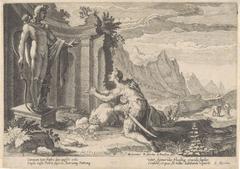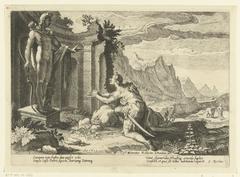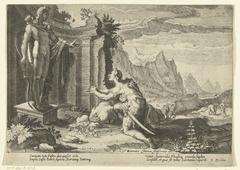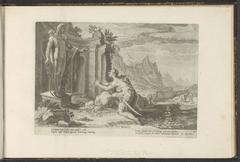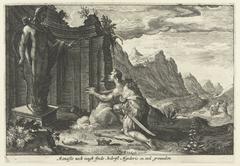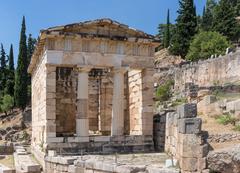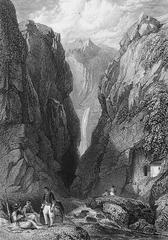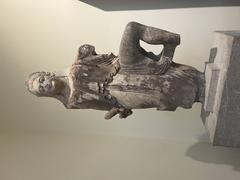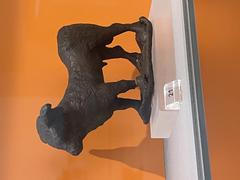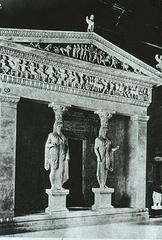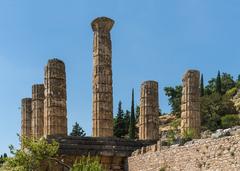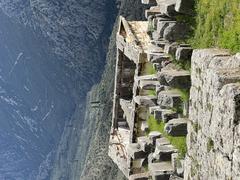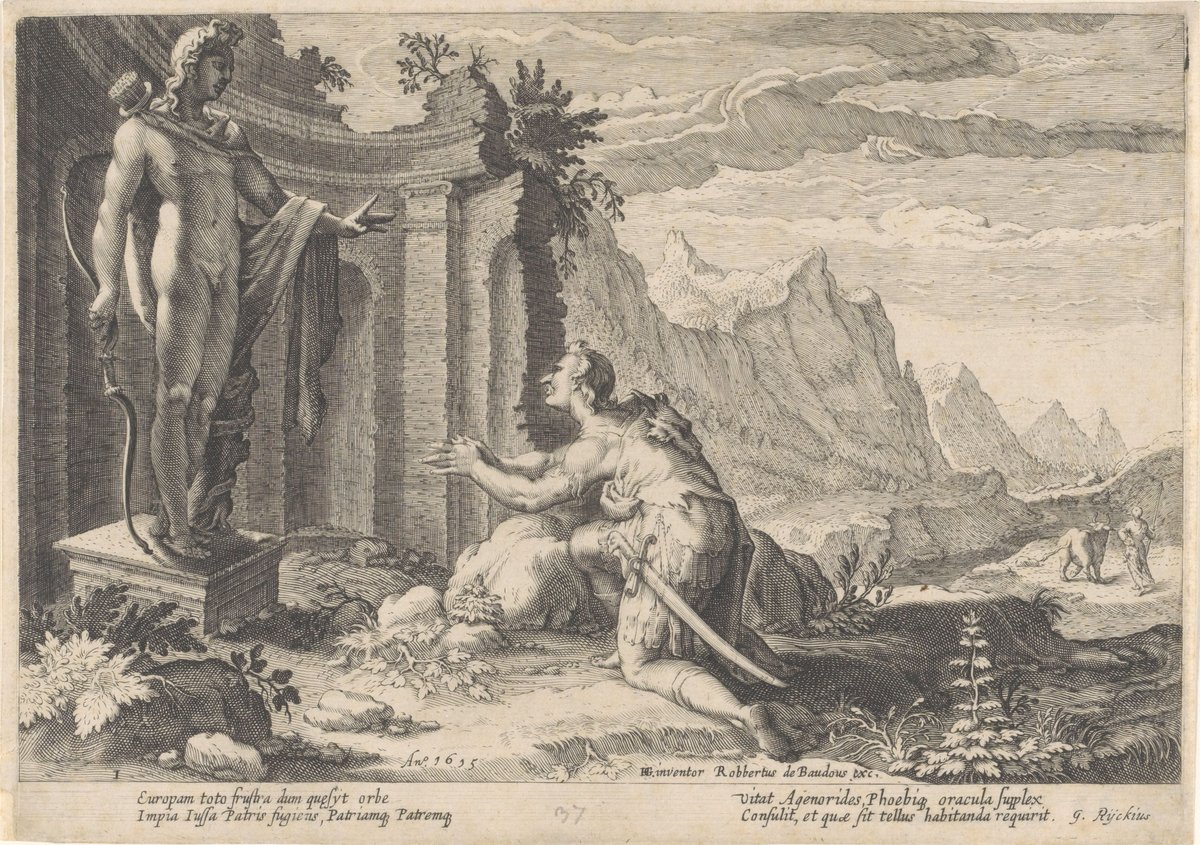
Delphic Oracle Delphi Greece: Visiting Hours, Tickets, and Historical Site Guide
Date: 14/06/2025
Introduction
Set dramatically on the slopes of Mount Parnassus in Central Greece, Delphi is a UNESCO World Heritage Site and one of antiquity’s most important sanctuaries. Revered as the “navel of the world,” Delphi drew pilgrims from across the Greek world seeking guidance from the Delphic Oracle—where the priestess Pythia delivered the cryptic words of Apollo. Today, Delphi’s well-preserved ruins, legendary history, and breathtaking scenery make it a must-see destination for travelers, history enthusiasts, and spiritual seekers alike (History.com; Greek Mythology Worldwide; Discover Greece).
This guide provides a comprehensive overview of Delphi’s mythological origins, the rise and influence of the Oracle, key monuments, practical visiting information, and tips to enrich your visit.
Mythological Origins and Early History
Sacred Beginnings
Delphi’s ancient roots are steeped in myth. Originally, the site was sacred to Gaia, the Earth goddess, and guarded by her serpent child, Python. According to legend, Apollo slew Python and claimed Delphi, establishing the sanctuary as his own. Another myth tells of Zeus releasing two eagles from opposite ends of the world, which met at Delphi, signifying it as the “omphalos” or navel of the earth (History.com; Britannica; Discover Greece).
Archaeological Foundations
Evidence suggests settlement in the area as early as the Mycenaean period (1600–1100 BCE), with formal religious activity dedicated to earth deities. The sanctuary of Apollo was established by the 8th century BCE, marking the beginning of Delphi’s significance as a center for prophecy (History Cooperative).
The Rise of the Oracle and Sanctuary
The Pythia and the Temple of Apollo
By the 8th century BCE, Delphi had become a prominent religious center. The Pythia, a priestess over age 50, entered trance states—possibly induced by vapors from beneath the Temple of Apollo—to deliver prophecies. Petitioners’ questions were interpreted and relayed by Apollo’s priests (Britannica; Greek Mythology Worldwide).
Growing Prestige
Delphi’s reputation soared, and by the 6th century BCE, it was the most significant oracle in Greece. Its neutrality (not controlled by any single city-state) and pan-Hellenic character attracted inquiries from individuals, city-states, and foreign rulers alike (World History Edu; The Collector).
Political and Cultural Influence
Shaping History
The Delphic Oracle’s prophecies influenced major political and military decisions. City-states consulted the Oracle before founding colonies, waging wars, or enacting laws. The ambiguous nature of the Pythia’s messages—like the double-edged prophecy to Croesus of Lydia—became legendary (Time Travel Turtle; Take Me to Greece).
Religious Festivals and the Pythian Games
Delphi hosted the Pythian Games, a major festival held every four years in honor of Apollo, featuring athletic, musical, and artistic contests rivaled only by the Olympic Games (Greek Mythology Worldwide).
Architectural Splendor
Lavish dedications from city-states funded the construction of treasuries, statues, and temples. Notable monuments include the Temple of Apollo, the theater, the stadium, and the Tholos of Athena Pronaia (Greeka; Discover Greece).
The Process of Divination
Rituals and Trance
Consulting the Oracle involved strict rituals. Petitioners purified themselves at the Castalian Spring, offered sacrifices, and presented questions to the priests. The Pythia entered the adyton (inner sanctum), inhaled vapors, and delivered her prophecies, which the priests then interpreted (History.com; Britannica).
Demand and Mystique
The Oracle’s fame brought lavish gifts and long waiting lists. The ambiguous prophecies contributed to Delphi’s mystique, allowing interpretations to fit a wide array of outcomes (History.com).
Periods of Crisis and Change
Sacred Wars and Rebuilding
Delphi’s wealth made it a target during the Sacred Wars (5th–4th centuries BCE). The Temple of Apollo was rebuilt after a fire in 548 BCE. Control of the sanctuary shifted between different Greek powers and later the Romans (History.com).
Roman Era and Decline
Delphi remained important in Roman times, visited by emperors like Nero and Hadrian. The Oracle’s influence waned with the rise of Christianity, and in 393 CE, pagan practices were officially banned (The Collector; Britannica).
Practical Visitor Information
Getting to Delphi
- By Car: About 2.5–3 hours northwest of Athens. Parking is available near the site.
- By Bus: KTEL buses depart from Athens’ Liosion Station (approx. 3 hours).
- Tours: Numerous agencies offer day trips or multi-day excursions from Athens (Greeka).
Delphi Visiting Hours
- Summer (April–October): 08:00 or 08:30–20:00
- Winter (November–March): 08:30–15:30 or 17:00
- Check the official Ministry of Culture website for current hours.
Tickets and Entry
- Combined Ticket: Around €12 (summer) / €6 (winter), includes the archaeological site and museum.
- Discounts: EU students (18–25 years), seniors, and children under 18 receive discounts or free admission.
- Free Admission Days: First Sunday of each month (November–March), March 6, April 18, May 18, October 28 (Greeka).
- Where to Buy: Onsite or online e-ticketing platform.
Accessibility
The site is built on uneven, hilly terrain. While the museum is wheelchair accessible, the outdoor archaeological areas can be challenging for those with reduced mobility. Some adapted pathways are available; contact site staff for assistance.
Facilities
- Restrooms: At the entrance and museum.
- Refreshments: Limited within the site, but available in the nearby village.
- Shops: Gift shops and kiosks near the entrance.
Travel Tips
- Footwear: Wear sturdy, comfortable shoes.
- Weather: Bring water, sunscreen, and a hat for summer; dress in layers in cooler months.
- Photography: Allowed throughout the site and museum; avoid flash and tripods where restricted.
Guided Tours and Audio Guides
Licensed guides are available at the entrance, and audio guides (including those on the Audiala app) provide in-depth historical context.
Delphi Archaeological Site: Highlights
- Sacred Way: The processional route lined with treasuries and statues.
- Temple of Apollo: Centerpiece of prophecy and spiritual activity.
- Theatre: Once hosted 5,000 spectators for music and drama contests.
- Stadium: Hosted the Pythian Games’ athletic competitions.
- Tholos of Athena Pronaia: Circular temple famed for its architecture.
- Castalian Spring: Purification site for pilgrims and the Pythia.
- Delphi Archaeological Museum: Houses the Charioteer of Delphi, Sphinx of Naxos, and other treasures (athenscabs.com).
- Village of Delphi: Offers accommodation, dining, and panoramic valley views.
Nearby Attractions
- Arachova: A mountain town known for traditional crafts and winter sports.
- Mount Parnassus: Hiking and skiing destination.
- Corycian Cave: Mythical site associated with Pan and the nymphs.
- Sanctuary of Athena Pronaia: Home to the iconic Tholos (Greeka).
Events and Cultural Experiences
- Cultural Festivals: Modern Delphic Festivals celebrate music, theater, and philosophy (tourismontheedge.com).
- Special Performances: Occasional concerts and exhibitions are held at the ancient theatre.
Frequently Asked Questions (FAQ)
Q: What are the Delphi visiting hours?
A: Summer: 08:00/08:30–20:00. Winter: 08:30–15:30/17:00. Check current schedules before your visit.
Q: How much are tickets?
A: €12 in high season, €6 in low season. Discounts and free admission apply to certain groups.
Q: Is the site accessible for those with mobility issues?
A: The museum is accessible, but the archaeological site has steep and uneven terrain; some areas may be adapted.
Q: Are guided tours available?
A: Yes, both on-site and via audio guides.
Q: Where can I eat or stay nearby?
A: The modern village of Delphi offers tavernas, restaurants, and a range of accommodation.
Summary and Final Tips for Visiting the Delphic Oracle
Delphi is a unique blend of myth, history, and natural beauty. To make the most of your visit:
- Plan for shoulder seasons (spring or autumn) for milder weather and fewer crowds.
- Wear suitable clothing and bring essentials (water, sunscreen, camera).
- Take a guided tour to deepen your understanding.
- Respect the site’s preservation efforts by staying on marked paths.
- Explore nearby attractions for a fuller experience of Central Greece.
For more tips, free audio guides, and updates, download the Audiala app and follow our channels.
Sources and Further Reading
- History.com
- Britannica
- Discover Greece
- Greek Mythology Worldwide
- Holidify
- Greeka
- Curioustravelbug.com
- Greeka - Sightseeing
- Athenscabs.com - Museum Guide
- Tourism on the Edge
- Greek Gods Paradise
